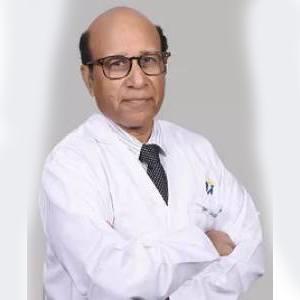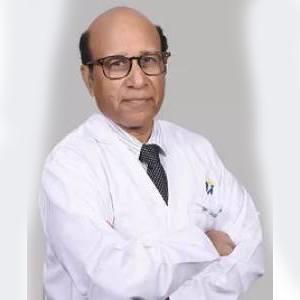Deep Vein Thrombosis Treatment in Chirag Enclave, Delhi
Introduction
Deep vein thrombosis (DVT), also referred to as thromboembolism, post-thrombotic syndrome, thrombosis, or postphlebitic syndrome, is a blood clot that develops inside the deep veins of your body. This clot may partially or entirely block your blood flow through that vein, resulting in swelling and pain. DVT usually occurs in your lower legs, pelvis, or thighs but can occur in other parts of your body too. This can generally occur if a part of the clot breaks off and travels in your bloodstream to other parts of your body, where it can get lodged. If it gets stuck in your lungs, it affects your blood flow to your lungs, leading to a complication called pulmonary embolism (obstruction). To prevent complications associated with deep vein thrombosis, it is essential to seek urgent medical assistance to identify DVTs symptoms.
What are the Symptoms of Deep Vein Thrombosis?
- In most cases, deep vein thrombosis may not have any symptoms. However, if you do experience symptoms, they may be as follows.
- Swelling of one leg.
- Leg pain associated with soreness and cramping
- Swollen veins which are painful to touch
- Warmth in your affected leg
- Red or bluish discoloration on your affected leg
What are the Causes of Deep Vein Thrombosis?
The leading cause of deep vein thrombosis is a blood clot. This clot prevents average blood circulation. Causes for clotting are as follows.
- Injury or damage to a blood vessel wall
- Damage to the vessel wall either during or post-surgery
- Prolonged bed rest with little to no leg movement.
- Inactivity or reduced mobility due to sitting or lying down for prolonged periods
- Certain medications which can increase clot formation
When should you See a Doctor?
Suppose you develop any of the symptoms mentioned above or have difficulty breathing, shortness of breath, or you’re coughing up blood. In that case, you need to seek urgent medical assistance as this can indicate a serious complication of deep vein thrombosis- pulmonary embolism.
For further clarifications, do not hesitate to search for a deep vein thrombosis specialist near me, a deep vein thrombosis hospital near me, or
Request an appointment at Apollo Spectra Hospitals, Chirag Enclave, Delhi
Call 1860 500 2244 to book an appointment
What are the Remedies / Treatment for Deep Vein Thrombosis?
The primary treatment of deep vein thrombosis is to break down the clot, prevent it from getting bigger, prevent it from breaking off, and reduce complications associated with the clot. Treatments are as follows.
- Medications to break the clot or thin your blood to prevent clot formation
- Compression stockings to decrease your chances of forming clots in your lower extremities
- Filter insertion into your large abdominal vein (vena cava) to stop clots from reaching your lungs and preventing pulmonary embolism
- Surgery to remove a large blood clot
Request an appointment at Apollo Spectra Hospitals, Chirag Enclave, Delhi
Call 1860 500 2244 to book an appointment
Conclusion
When a blood clot forms in the deep veins of your legs, it is referred to as deep vein thrombosis. DVT may not have symptoms. However, they can get serious, especially if part of a clot breaks off and gets lodged in your lungs. Urgent medical assistance is required to prevent complications. Your doctor can advise you on what preventive or curative measures are best suitable for you.
Reference Links
https://www.mayoclinic.org/diseases-conditions/deep-vein-thrombosis/symptoms-causes/syc-20352557
After taking your medical history, your doctor may advise specific tests like a duplex venous ultrasound and venography to identify any blood clots, Magnetic Resonance Imaging (MRI), Magnetic Resonance Venography (MRV), or a Computed Tomography (CT scan) to determine your internal organs and blood vessels and any formation or dislodgement of your clot. Your doctor may also advise specific blood tests if your blood clots are caused due to a genetic (hereditary) factor.
Pulmonary embolism (blocking of the blood vessel of your lung due to a clot), postphlebitic syndrome (damage to your veins due to the blood clot), and DVT treatment complications like bleeding due to side effects of prescribed clot-breaking or blood-thinning medications are some complications of DVTs.
Avoiding sitting for prolonged periods, abstaining from smoking, and exercising to maintain a healthy body weight are some measures to prevent DVT.
Symptoms
Our Doctors
DR. GULSHAN JIT SINGH
MBBS, MS (General Su...
| Experience | : | 49 Yeras Experience |
|---|---|---|
| Speciality | : | Vascular Surgery... | Location | : | Chirag Enclave |
| Timings | : | Tue, Fri: 2:00 PM to... |
DR. JAISOM CHOPRA
MBBS, MS, FRCS...
| Experience | : | 38 Yeras Experience |
|---|---|---|
| Speciality | : | Vascular Surgery... | Location | : | Chirag Enclave |
| Timings | : | Mon - Sat : 2:00 PM ... |
DR. JAISOM CHOPRA
MBBS, MS, FRCS...
| Experience | : | 38 Yeras Experience |
|---|---|---|
| Speciality | : | Vascular Surgery... | Location | : | Karol Bagh |
| Timings | : | Thur : On Call... |
Our Top Specialities
NOTICE BOARD
CONTACT US
CONTACT US
 Book Appointment
Book Appointment





.svg)
.svg)
.svg)
.svg)








